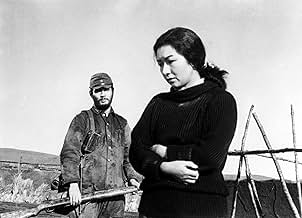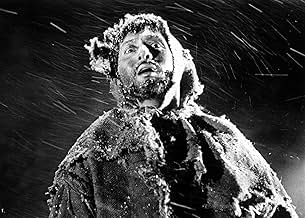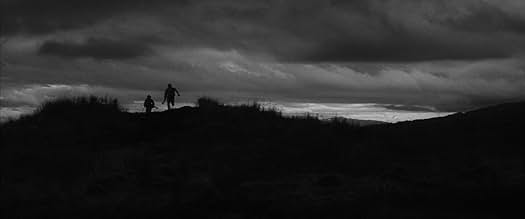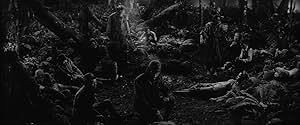La condizione umana: Parte III - La preghiera del soldato
Titolo originale: Ningen no jôken
VALUTAZIONE IMDb
8,8/10
8110
LA TUA VALUTAZIONE
Aggiungi una trama nella tua linguaHis ideals challenged by life as a conscript in war-time Japan's military, a pacifist faces ever greater tests in his fight for survival.His ideals challenged by life as a conscript in war-time Japan's military, a pacifist faces ever greater tests in his fight for survival.His ideals challenged by life as a conscript in war-time Japan's military, a pacifist faces ever greater tests in his fight for survival.
- Regia
- Sceneggiatura
- Star
- Premi
- 5 vittorie totali
Recensioni in evidenza
This trilogy was a grueling and rewarding. It was chilling to watch but I persevered. It was about the conflict between nationalism and the individual struggling for humanism. If you transfer yourself to post WW2 Japan you could see how powerful this film was. It was necessary for the soul searching that was to heal the results of the war.
It is as important today as it was then.
This trilogy affected me deeply after watching it.
There is hardly a frame in the ten hours that does not have any sub-text associated with it.
The ten hour film format has some merits maybe it will catch on.
It is as important today as it was then.
This trilogy affected me deeply after watching it.
There is hardly a frame in the ten hours that does not have any sub-text associated with it.
The ten hour film format has some merits maybe it will catch on.
10ibts12
i had listened a lot about this movie but was unlucky that i had not seen this. This is a fascinating movie and i think that i am still feeling effect of the movie on my personality. I never imagined that even a movie can effect someone so much,and also there is feeling that what should be an excellent human condition ( as shown by Kaji and his wife) and what is prevailing human condition as we see around us. I have deep regards for all the crew of the movie who provided us a worth seeing and personality effecting movie. I dedicate all I have learned to the director of movie Masaki Kobayashi.
I have given the movie 10/10 because i find no point to deduct even a single mark. I recommend all serious movie viewers to kindly must see this movie and try to learn from it.
I have given the movie 10/10 because i find no point to deduct even a single mark. I recommend all serious movie viewers to kindly must see this movie and try to learn from it.
If you have any remote interest in film go see this right away. Don't bother watching if you are too scared to attempt the entire 10 hours in one sitting. It's worth it and then some. The actor playing Kaji was terrific and each part turns out better than the last (everything really, the acting/camera work... all the bells and whistles just sound better the further in you get). It definitely struck me as something Adolfas Mekas would totally dig, which says a lot. This is a must see. If you decide to bring the wife and kids (or husband and mother-in-law or what- have-you) just be warned: this movie involves a fair amount of human suffering, on and off the screen. -Ed Hellman.
The last film in Kobayashi's epic trilogy picks up with Kaji (Tatsuya Nakadai) and a couple of his buddies trying to make their way through war-torn Manchuria and back to what they consider home. Their unit has been wiped out and while they're not sure if Japan has formally surrendered, they're well aware the its defeat is imminent. They are in danger from the Soviets who control the region, as well as armed peasant militia groups. They come across scattered Japanese civilians and try to help them as best they can, but struggle because food is incredibly scarce, and tough, no-win choices have to be made. They also come across small Japanese military who are attempting to continue the fight, which they want no part of.
As in the other films, the emotions are heart-wrenching, and this is one of the more powerful anti-war films you'll find. The cinematography is fantastic, the production quality is high, and the pace of the storytelling moves along well enough that the 190-minute runtime didn't feel like a burden, or as overwhelming as it may appear. That in itself is an achievement, considering the somber subject of the film.
Notable points for me:
As in the other films, the emotions are heart-wrenching, and this is one of the more powerful anti-war films you'll find. The cinematography is fantastic, the production quality is high, and the pace of the storytelling moves along well enough that the 190-minute runtime didn't feel like a burden, or as overwhelming as it may appear. That in itself is an achievement, considering the somber subject of the film.
Notable points for me:
- The recognition of rape during wartime, and in a broader sense, how vulnerable people like the elderly or farmers are forced to endure great hardship - and this comes from both enemy and friendly forces. The image of the women dumped out of a moving truck after having been raped is brutal.
- The thoughts of some of the characters being revealed in interior monologues. Kaji is haunted by the people he's seen die, the trauma he's endured, and the enemy soldiers he's killed, which he likens to murder. The flashbacks to earlier images are powerful reminders that people can't just walk out of these experiences unchanged. We also get a glimpse into the minds of his comrades, with one man thinking it would have been better had he died an honorable death on the battlefield, and another fearing how it will look for him, a superior to Kaji, being led by him. Even under such duress, the ego and concern about hierarchy spoke volumes about the male mind.
- The irony of ending up in a Soviet work camp, forced to do hard labor with minimal food, bringing the story full circle to when the Japanese had Manchurians in a similar camp in part one. One nation is on top one moment, oppressing another, and then the tide turns. We see this also in the Soviets proudly listening to their national anthem in the work camp, clearly patriotic and with a giant image of Stalin behind the commander, similar to the nationalism in Japan before the war.
- Similarly, the discussion between soldiers that the Soviets will not stay in Manchuria, which will result in a civil war between Chiang Kai-Shek and the communist Chinese under Mao Zedung. There is an implication that war begets war, and the cycle never seems to end.
- The disillusionment in one's ideals - and I don't mean the Japanese soldiers becoming disillusioned over the 'divine' Emperor's militarism, since that was present from the beginning of the story (though a younger soldier does go through an arc in that regard). I mean Kaji's communist sympathies getting a reality check when he finds that his Soviet captors have a "smug and selfish" attitude about them, which his friend chalks up to them taking a "Soviet-first policy," in stark contrast to communism's ideal of the worldwide proletarian.
- The attempts at communicating with the Soviet officers reflect this disillusionment, and also show how things lost in translation prevent communication. Kaji is at the mercy of a bad translator, and can't express the simple needs of his men or his personal views. Ironically, he's labeled a fascist by the Soviets, which is completely at odds with his beliefs.
- Life is broken down into its most elemental form, the need to eat, and will to survive. We see people desperate from hunger from the beginning of this film all the way through to the end. Pushed to extreme conditions, people become selfish, and sadly, empathy is scarce. Kaji tries to navigate these waters as best he can, treating people with dignity and holding on to his ideals, but there are limits to everything. One of the Japanese soldiers has become a collaborator to the Soviets, overseeing the prisoners like a kapo would for the Nazis, and contributes to the death of one of his friends. Kaji shows him no mercy as he beats him to death with a chain, and while there is something cathartic about that moment, it's such a contrast to the man we saw at the beginning of the first film - and sad to me that I felt myself urging him on.
- The ending, my god. Kaji tries to run away from the senseless violence of the world, realizing ideologies turn into fuel for warfare and oppression, and wants simply to return to the only thing that makes any sense in life - love - which is something that struck me at my very heart. With surreal imagery, Kobayashi gives us an ending that is extraordinary and indelible. He wanted it to be. The only way to avoid the cycle of war from repeating is to learn from the past, and that's what his trilogy is about.
The Human Condition 10 Hours Long 10 Hours Deep, Without a Doubt the Greatest Anti-War Statement Ever Made... What A Journey.
Lo sapevi?
- QuizIs the first Japanese movie in stereo.
I più visti
Accedi per valutare e creare un elenco di titoli salvati per ottenere consigli personalizzati
- How long is The Human Condition III: A Soldier's Prayer?Powered by Alexa
Dettagli
- Data di uscita
- Paese di origine
- Lingue
- Celebre anche come
- The Human Condition III: A Soldier's Prayer
- Luoghi delle riprese
- Rishiri-Rebun-Sarobetsu National Park, Hokkaido, Giappone(The final scene was shot on the Sarobetsu Plain.)
- Aziende produttrici
- Vedi altri crediti dell’azienda su IMDbPro
- Tempo di esecuzione3 ore 10 minuti
- Colore
- Proporzioni
- 2.35 : 1
Contribuisci a questa pagina
Suggerisci una modifica o aggiungi i contenuti mancanti

Divario superiore
What is the German language plot outline for La condizione umana: Parte III - La preghiera del soldato (1961)?
Rispondi






























